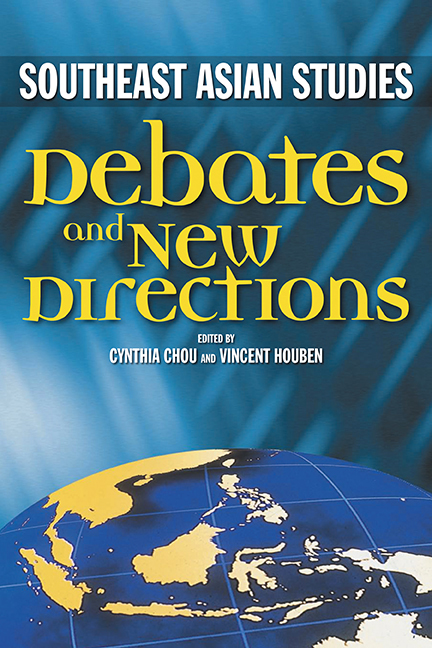Book contents
- Frontmatter
- Contents
- List of Contributors
- Preface
- 1 Introduction
- 2 Southeast Asia: Personal Reflections on a Region
- 3 Region, Academic Dynamics, and Promise of Comparitivism: Beyond Studying ‘Southeast Asia’?
- 4 Towards Multi-Laterality in Southeast Asian Studies: Perspectives from Japan
- 5 The Academic's New Clothes: The Cult of Theory versus the Cultivation of Language in Southeast Asian Studies
- 6 Rethinking Southeast Asian Politics
- 7 Reconceptualizing Southeast Asian Studies
- 8 Southeast Asian History: The Search for New Perspectives
- 9 Film, Literature, and Context in Southeast Asia: P. Ramlee, Malay Cinema, and History
- Bibliography
- Index
7 - Reconceptualizing Southeast Asian Studies
Published online by Cambridge University Press: 21 October 2015
- Frontmatter
- Contents
- List of Contributors
- Preface
- 1 Introduction
- 2 Southeast Asia: Personal Reflections on a Region
- 3 Region, Academic Dynamics, and Promise of Comparitivism: Beyond Studying ‘Southeast Asia’?
- 4 Towards Multi-Laterality in Southeast Asian Studies: Perspectives from Japan
- 5 The Academic's New Clothes: The Cult of Theory versus the Cultivation of Language in Southeast Asian Studies
- 6 Rethinking Southeast Asian Politics
- 7 Reconceptualizing Southeast Asian Studies
- 8 Southeast Asian History: The Search for New Perspectives
- 9 Film, Literature, and Context in Southeast Asia: P. Ramlee, Malay Cinema, and History
- Bibliography
- Index
Summary
How relevant is the area study of “Southeast Asia” when it is seemingly more fashionable to be engaged in current discourses on the new geography of globalization, de-territorialization, and borderless worlds? Does talking about “Southeast Asian studies” make sense in the face of ongoing debates about there being “no sense of place” in our modern world?
Donald Emmerson's essay on ‘Southeast Asia’: What's in a Name?” is one of the most widely read deconstructive accounts on the imagined constructedness of this “externally defined region”. Numerous other insightful essays by scholars from a plethora of disciplines have reaffirmed the contrived identity of this region and the exogenous character of Southeast Asian studies.
Indeed, “Southeast Asia” cannot boast fixed borders and boundaries to define it. For that reason, and all the more in the context of current political and intellectual movements, we are faced with questions such as “What is the future of Southeast Asian studies?” and “Has the time arrived for us to re-conceptualize and radically reorientate Southeast Asian studies?”
THE TRAJECTORIES OF SOUTHEAST ASIAN STUDIES
There exists as Itty Abraham, Director of the Southeast Asia Programme of the Social Science Research Council in 1999, says “no reliable way of measuring the vitality” of this field of study. Nonetheless, a comparative and longitudinal view of the analytic models and traditions of research will help us synthesize our deliberations. I cringe from saying that I shall present a complete survey of the epistemological trajectories of Southeast Asian Studies. My attempt will be but a modest snapshot, to show the agreements and disagreements in experiences and optics in this field of study, as well as to evoke a sense and the scope of our challenge in conceptualizing this field of academic inquiry. In preparing for this discussion, I was inspired by several thought-provoking works and in particular the recent contributions of Bowen, King, and Heryanto to the ongoing discussions on Southeast Asia as a field of study.
- Type
- Chapter
- Information
- Southeast Asian StudiesDebates and New Directions, pp. 123 - 139Publisher: ISEAS–Yusof Ishak InstitutePrint publication year: 2006



